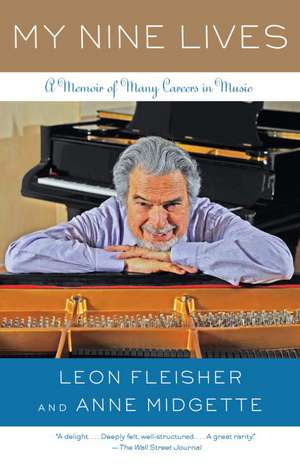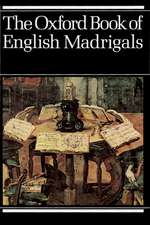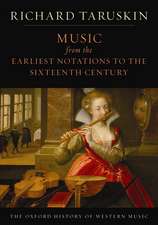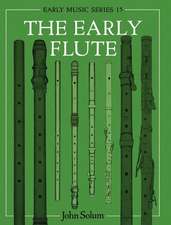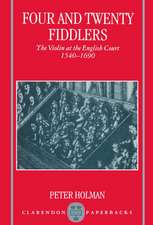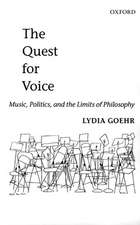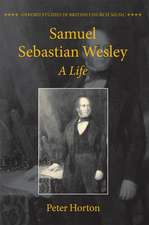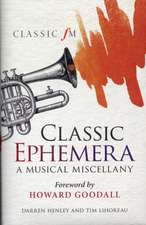My Nine Lives: A Memoir of Many Careers in Music
Autor Leon Fleisher, Anne Midgetteen Limba Engleză Paperback – 31 oct 2011
At the peak of his career, celebrated pianist Leon Fleisher suddenly lost the use of two fingers on his right hand. Miraculously, at the age of sixty-six, he was diagnosed with focal dystonia, and learned to manage it through a combination of physical therapy and experimental Botox injections. In 2003 Fleisher returned to Carnegie Hall to give his first two-handed performance in over three decades and brought down the house.
With his coauthor, celebrated music critic Anne Midgette, Fleisher reveals here for the first time the depression that threatened to engulf him as his condition worsened, and the sheer love of music that rescued him from complete self-destruction.
Preț: 89.13 lei
Nou
Puncte Express: 134
Preț estimativ în valută:
17.06€ • 17.62$ • 14.20£
17.06€ • 17.62$ • 14.20£
Carte disponibilă
Livrare economică 04-18 martie
Livrare express 18-22 februarie pentru 23.47 lei
Preluare comenzi: 021 569.72.76
Specificații
ISBN-13: 9780767931373
ISBN-10: 0767931378
Pagini: 325
Ilustrații: 16 PP. B&W
Dimensiuni: 135 x 204 x 19 mm
Greutate: 0.33 kg
Editura: Anchor Books
ISBN-10: 0767931378
Pagini: 325
Ilustrații: 16 PP. B&W
Dimensiuni: 135 x 204 x 19 mm
Greutate: 0.33 kg
Editura: Anchor Books
Notă biografică
Born in San Francisco, LEON FLEISHER made his Carnegie Hall debut at sixteen. He was Musical America’s Instrumentalist of the Year in 1994; the subject of the 2006 Oscar-nominated short documentary Two Hands: The Leon Fleisher Story; and a 2007 Kennedy Center Honoree. He continues to tour the world on an ambitious performance schedule.
ANNE MIDGETTE is the chief classical musical critic of the Washington Post. A Yale graduate, she was previously a regular reviewer of classical music and theater for the New York Times.
ANNE MIDGETTE is the chief classical musical critic of the Washington Post. A Yale graduate, she was previously a regular reviewer of classical music and theater for the New York Times.
Extras
Chapter One
For Mr. Shorr, it wasn't a good lesson until he made me cry. Lev Shorr was my piano teacher. Slender, with a bald spot on top of his head, he sported a cane that he didn't need and wore pince-nez glasses that attached to the bridge of his nose with a spring-and even, incredibly enough, spats. He looked as though he had stepped out of an illustration for a men's haberdashery. He was like James Mason, but with a Russian accent. Mr. Shorr was a prodigy maker. He was also a pianist of some distinction, and he dressed the part. He was the pianist of the San Francisco Symphony; he accompanied Yehudi Menuhin, a local boy, when he was in town. But his real reputation ultimately derived from his students. There was a huge concentration of so-called child geniuses around San Francisco in those days. Shorr had taught Menuhin's sisters, Hephzibah and Yalta. He taught a girl named Laura Dubman, who gave her debut recital at the age of five and was supposed to be a rising piano talent (she later worked at MGM and taught Katharine Hepburn how to look like she was really playing the piano as Clara Schumann in Song of Love). He taught Ruth Slenczynska, who was really a big deal for a while, until she had a nervous breakdown in her teens that put her career on hiatus for a few decades. He later taught Stephen Kovacevich, who went on to be a star soloist in the generation after mine. And he taught me.
His manner was just as taut and crisp and old school as his appearance. In lessons, he focused on technique. "Technique” meant, of course, Russian technique, the classic approach for virtuosos: for Mr. Shorr, that was the only technique there was. Our fingers were to be curved over the keys and raised and lowered like little hammers. Physiologically, this approach, widespread as it is, doesn't actually make sense, and I suspect Mr. Shorr might have done harm to some players, although many of his students did go on to careers all over the world. It wasn't much fun, though. If you played a clinker, he all but rapped you on the fingers with his cane. He never actually did that, but you felt he might. When I was six or seven and trying with all my might to please him, it wasn't long before tears of frustration would rise to the surface. But he wasn't an unkind man. He could also be rather paternalistic. Not that he would exactly comfort me when I began to cry, but after it happened he invariably took me out to lunch, for lamb chops. There was obviously method to his madness. He didn't succeed in molding me to the Russian technique, but to this day I have retained a marked love of lamb chops.
I can't actually remember a time when I wasn't playing the piano. I started when I was four years old, and my whole life came very quickly to revolve around the instrument-an upright piano, in the living room of whatever San Francisco apartment we happened to be living in at the moment. We moved around a lot. The piano was my mother's idea. My parents didn't have any real connection to music, but for my mother the instrument represented, as it did for many immigrants, a gateway to a new and better world. My father, Isidor Fleisher, was straight off the boat. He was born in Odessa, and his family emigrated to the United States with him when he was thirteen to join his brother, who had gone on ahead and established himself. He met my mother one summer night on the Lower East Side of Manhattan, when the sweltering heat had driven everyone out of their apartments and up onto the rooftops and fire escapes in search of a breath of fresh air. Those were different days.
My mother was born in Chelm, a little town in Poland that is known, in Jewish folklore, as a center of foolishness. The traditional stories about the stupidity of the Chelmers have been taken up and elaborated by authors like Sholem Aleichem and Isaac Bashevis Singer; you could call them the original Polish jokes. They say that when God created the world, he sent out an angel with two bags, one filled with wisdom and one with foolishness: the latter, being heavier, dragged the angel down, snagged on a mountaintop, ripped open, and spilled its contents all over Chelm. Thereafter, the Chelmers were an idiosyncratic bunch. For instance, the city fathers decided one day that they wanted trees in front of the courthouse-so the Chelmers picked up the courthouse and moved it into the forest. My mother, of course, wanted nothing to do with that sort of silliness.
My parents didn't have a lot of formal education. My father was a milliner. He made ladies' hats, little pillboxes, out of straw. I have no idea where he learned to do that. He came out to San Francisco at the behest of an uncle, who was manufacturing hats for the navy. I'm quite sure the navy hats were only the remotest preparation for what my father ended up doing in San Francisco. Somewhere along the way, he lost the c in his last name, because while his brothers and sisters all went by "Fleischer," my immediate family has always been plain "Fleisher." Perhaps he wanted something that sounded more American. He had a little shop on Geary Street, catty-corner to the Clift Hotel. One day he came home quite excited because a lovely red-headed girl had come in and bought one of his hats and then told him that her name was Lucille Ball. That really perked him up. He didn't have that kind of clientele all the time, but he became successful enough to open a second shop on Fillmore Street. My mother ran that one.
My mother, Bertha, was a strong, strong personality. I think she was part Tartar: dark skin, firm features, and stubborn. She was also a little bit crazy. She was fixated on getting the best for her family, and she would do whatever it took to achieve that end. She was certainly driven. She came over to America on her own, at the age of twenty, and she married my father two years later. Even without education, she was keenly aware that there were higher things in life. In her later years, she would sit and read Emerson by the hour; she appeared to find great comfort in that. For her, that was just one example of the kinds of things that could enrich one's life and bring some kind of peace and tranquility and satisfaction. Music, evidently, was another. One of my early publicity biographies states that she was a singer herself. That’s complete nonsense. I suspect that someone asked her a question in such away that by omission she allowed this misapprehension to continue.
She certainly had big dreams for me. I was going to be either the first Jewish president or a great concert pianist. It's fortunate that my talents were apportioned in such a way that I was able to fulfill at least one of those goals. It doesn't always work out that way. The piano was purchased for my brother, Ray, five and a half years older than I, who started lessons when he was around nine years old. In those days-the early 1930s-teachers, like doctors, made house calls; they came to you. Ray would come home from school and the teacher would arrive, and I would curl up in a corner of the big sofa in the living room and listen to my brother’s lesson. After the teacher left, Ray would go out and play in the park with his friends, and I would go to the piano and redo his entire lesson, copying everything the teacher had asked of him. It wasn't long before my parents decided to switch the lessons to me. That's how it all began. At least, that’s how the story goes in our family.
My first teacher was a woman named Lillian Lanier, who taught me the notes and keys, but it was soon obvious to everyone that I needed more of a challenge. Mr. Shorr was supposed to be the best in San Francisco, so off to Mr. Shorr I went. I was, of course, too special to go to regular school like other children. I was enrolled briefly in kindergarten, but it seemed like such a waste of time. We had to take naps every afternoon on straw mats on a hard floor, and I objected to this fairly strenuously. Certainly my mother saw the whole project as detracting from precious hours I might otherwise have spent practicing. Accordingly, I was withdrawn from kindergarten after two weeks and set up with a succession of private tutors in a range of subjects, which constituted my formal education for the rest of my childhood. I've long thought of entitling my autobiography I Was a Kindergarten Dropout. So for the rest of my childhood, my brother, Ray, was the one who went to school and had friends and a normal life. And I was the one who practiced.
I can't say it was a happy childhood. Since my mother worked, I was supervised by governesses, like a woman named Muriel Fraser, who was with us for several years. She was a rather uncompromising figure. She used to wallop me with wooden coat hangers across the back of my legs when I wasn't good. She became a nun after she left us. San Francisco had a considerable musical life when I was a child, even if most of its institutions-the symphony, the opera-were relatively new. Compared with Los Angeles, it was downright cosmopolitan. The San Francisco Symphony was founded in 1911, and the San Francisco Opera in 1923; they both moved into the brand-new War Memorial Opera House in 1932, when I was four. But opera in San Francisco went back a lot farther than that. A notorious episode in American opera history was the 1906 Metropolitan Opera tour that placed Enrico Caruso in San Francisco at exactly the moment of the great earthquake and the ensuing fire, an experience that left the tenor shaken and traumatized and that he used as a reason never to return to San Francisco.
Not everyone on the tour had the same reaction. Alfred Hertz, the star conductor on that tour (he described the earthquake as sounding like a “mezzo forte roll on a cymbal or gong"), ultimately developed such a rapport with the city that he settled there in 1915 (the year San Francisco hosted the World's Fair) as the second-ever music director of the fledgling San Francisco Symphony and stayed there for the rest of his life. Hertz was as bald as a billiard ball, with a formidable dark, bushy beard that was salt-and-pepper gray by the time I knew him and round wire-framed glasses: a bona fide representative of the great European tradition, straight out of the concert halls of Gustav Mahler. His appearance was also notoriously easy to caricature (Caruso left a drawing of him among his affectionate send-ups of his Met Opera colleagues). Crippled as a child by what they used to call infantile paralysis-that is, polio-he walked with a cane for all of his adult life, but this did not diminish his notable vigor. He had aloud laugh, an ear for a joke, and an eye for a pretty girl. "Come for dinner, stay for breakfast!" he used to say, laughing, while his wife, Lilly, made derogatory noises in the background.
He was also a formidable and renowned musician. In the early years of the twentieth century he led a number of world premieres at the Metropolitan Opera, as well as the first American performances of Strauss's Der Rosenkavalier and Salome. (The opera, based on the Oscar Wilde play and depicting Salome kissing John the Baptist's severed head, created such a scandal in 1907 that it was withdrawn and not performed again until 1934.) Even more notorious, though, was the first American production of Richard Wagner’s Parsifal. This was a monumental event-front-page news for many American papers-because Wagner had forbidden the performance of the work anywhere other than his own theater in Bayreuth, so the Met's doing it was tantamount to sacrilege in the eyes of many European music lovers. Mind you, the Met production didn't take place until 1903, twenty years after Wagner's death, but the prohibition was actively upheld by Wagner's acolytes, first and foremost his widow, Cosima. Cosima Wagner's clout in Europe was such that after Hertz conducted that Parsifal, he never conducted in an opera house in Germany again.
Europe's loss (and the Met's, after Hertz left the company in 1915 over artistic differences with its director) was San Francisco's gain. Hertz's stature was such that he was able to attract a whole new caliber of player to San Francisco, both as soloists and as orchestra players. The violinist Louis Persinger, for instance, was the concertmaster of the Berlin Philharmonic before Hertz lured him to take that position at the San Francisco Symphony. With this kind of musician on its roster, the San Francisco Symphony quickly developed into a serious professional orchestra. It was also, to Hertz's credit, the first American orchestra to admit women as anything other than harpists. And the presence of so many good musicians doubtless contributed to the child-prodigy boom in San Francisco in the 1920s and 1930s.There were a striking number of talented children performing around the city. Persinger himself taught Menuhin, Ruggiero Ricci, and Isaac Stern, among others.
Hertz was also forward-looking. He was committed to education and outreach-words that didn't have as much currency in the classical music world in those days as they do now-and was happy to explore new ways of reaching audiences. In 1922, for example, he was the only conductor willing to gamble on leading a motley series of outdoor orchestra concerts with the brand-new Los Angeles Philharmonic in the Hollywood Hills-the first season of the Hollywood Bowl, a summer series he continued to lead for years as it rapidly became a popular fixture of the country's musical life. He was also eager to explore recording and radio. The San Francisco Symphony became one of the first American orchestras to make commercial recordings, starting in the1920s. And after he retired from the symphony in 1930, he continued to lead pioneering series of regular radio broadcasts. He went on in the late 1930s to found the orchestra of the Northern California Chapter of the Works Progress Administration, the WPA.
More to the point, as far as my own story is concerned, was Hertz's eye for young talent. Three young artists were his particular protégés in his San Francisco years. There was Menuhin, who, of course, got everyone’s attention in San Francisco when he was young. There was the conductor Leslie Hodge, who led a number of the WPA Orchestra concerts. And there was me. Most of my first orchestral concerts-at the advanced age of eight and nine years old-were with that WPA orchestra, often performing in schools. I used to play the first or third movement-never, for some reason, the slow movement-of Beethoven's B-flat concerto, the second concerto. They didn't want to tax a child's powers of concentration by making me play, or the students listen to, the whole thing.
From the Hardcover edition.
For Mr. Shorr, it wasn't a good lesson until he made me cry. Lev Shorr was my piano teacher. Slender, with a bald spot on top of his head, he sported a cane that he didn't need and wore pince-nez glasses that attached to the bridge of his nose with a spring-and even, incredibly enough, spats. He looked as though he had stepped out of an illustration for a men's haberdashery. He was like James Mason, but with a Russian accent. Mr. Shorr was a prodigy maker. He was also a pianist of some distinction, and he dressed the part. He was the pianist of the San Francisco Symphony; he accompanied Yehudi Menuhin, a local boy, when he was in town. But his real reputation ultimately derived from his students. There was a huge concentration of so-called child geniuses around San Francisco in those days. Shorr had taught Menuhin's sisters, Hephzibah and Yalta. He taught a girl named Laura Dubman, who gave her debut recital at the age of five and was supposed to be a rising piano talent (she later worked at MGM and taught Katharine Hepburn how to look like she was really playing the piano as Clara Schumann in Song of Love). He taught Ruth Slenczynska, who was really a big deal for a while, until she had a nervous breakdown in her teens that put her career on hiatus for a few decades. He later taught Stephen Kovacevich, who went on to be a star soloist in the generation after mine. And he taught me.
His manner was just as taut and crisp and old school as his appearance. In lessons, he focused on technique. "Technique” meant, of course, Russian technique, the classic approach for virtuosos: for Mr. Shorr, that was the only technique there was. Our fingers were to be curved over the keys and raised and lowered like little hammers. Physiologically, this approach, widespread as it is, doesn't actually make sense, and I suspect Mr. Shorr might have done harm to some players, although many of his students did go on to careers all over the world. It wasn't much fun, though. If you played a clinker, he all but rapped you on the fingers with his cane. He never actually did that, but you felt he might. When I was six or seven and trying with all my might to please him, it wasn't long before tears of frustration would rise to the surface. But he wasn't an unkind man. He could also be rather paternalistic. Not that he would exactly comfort me when I began to cry, but after it happened he invariably took me out to lunch, for lamb chops. There was obviously method to his madness. He didn't succeed in molding me to the Russian technique, but to this day I have retained a marked love of lamb chops.
I can't actually remember a time when I wasn't playing the piano. I started when I was four years old, and my whole life came very quickly to revolve around the instrument-an upright piano, in the living room of whatever San Francisco apartment we happened to be living in at the moment. We moved around a lot. The piano was my mother's idea. My parents didn't have any real connection to music, but for my mother the instrument represented, as it did for many immigrants, a gateway to a new and better world. My father, Isidor Fleisher, was straight off the boat. He was born in Odessa, and his family emigrated to the United States with him when he was thirteen to join his brother, who had gone on ahead and established himself. He met my mother one summer night on the Lower East Side of Manhattan, when the sweltering heat had driven everyone out of their apartments and up onto the rooftops and fire escapes in search of a breath of fresh air. Those were different days.
My mother was born in Chelm, a little town in Poland that is known, in Jewish folklore, as a center of foolishness. The traditional stories about the stupidity of the Chelmers have been taken up and elaborated by authors like Sholem Aleichem and Isaac Bashevis Singer; you could call them the original Polish jokes. They say that when God created the world, he sent out an angel with two bags, one filled with wisdom and one with foolishness: the latter, being heavier, dragged the angel down, snagged on a mountaintop, ripped open, and spilled its contents all over Chelm. Thereafter, the Chelmers were an idiosyncratic bunch. For instance, the city fathers decided one day that they wanted trees in front of the courthouse-so the Chelmers picked up the courthouse and moved it into the forest. My mother, of course, wanted nothing to do with that sort of silliness.
My parents didn't have a lot of formal education. My father was a milliner. He made ladies' hats, little pillboxes, out of straw. I have no idea where he learned to do that. He came out to San Francisco at the behest of an uncle, who was manufacturing hats for the navy. I'm quite sure the navy hats were only the remotest preparation for what my father ended up doing in San Francisco. Somewhere along the way, he lost the c in his last name, because while his brothers and sisters all went by "Fleischer," my immediate family has always been plain "Fleisher." Perhaps he wanted something that sounded more American. He had a little shop on Geary Street, catty-corner to the Clift Hotel. One day he came home quite excited because a lovely red-headed girl had come in and bought one of his hats and then told him that her name was Lucille Ball. That really perked him up. He didn't have that kind of clientele all the time, but he became successful enough to open a second shop on Fillmore Street. My mother ran that one.
My mother, Bertha, was a strong, strong personality. I think she was part Tartar: dark skin, firm features, and stubborn. She was also a little bit crazy. She was fixated on getting the best for her family, and she would do whatever it took to achieve that end. She was certainly driven. She came over to America on her own, at the age of twenty, and she married my father two years later. Even without education, she was keenly aware that there were higher things in life. In her later years, she would sit and read Emerson by the hour; she appeared to find great comfort in that. For her, that was just one example of the kinds of things that could enrich one's life and bring some kind of peace and tranquility and satisfaction. Music, evidently, was another. One of my early publicity biographies states that she was a singer herself. That’s complete nonsense. I suspect that someone asked her a question in such away that by omission she allowed this misapprehension to continue.
She certainly had big dreams for me. I was going to be either the first Jewish president or a great concert pianist. It's fortunate that my talents were apportioned in such a way that I was able to fulfill at least one of those goals. It doesn't always work out that way. The piano was purchased for my brother, Ray, five and a half years older than I, who started lessons when he was around nine years old. In those days-the early 1930s-teachers, like doctors, made house calls; they came to you. Ray would come home from school and the teacher would arrive, and I would curl up in a corner of the big sofa in the living room and listen to my brother’s lesson. After the teacher left, Ray would go out and play in the park with his friends, and I would go to the piano and redo his entire lesson, copying everything the teacher had asked of him. It wasn't long before my parents decided to switch the lessons to me. That's how it all began. At least, that’s how the story goes in our family.
My first teacher was a woman named Lillian Lanier, who taught me the notes and keys, but it was soon obvious to everyone that I needed more of a challenge. Mr. Shorr was supposed to be the best in San Francisco, so off to Mr. Shorr I went. I was, of course, too special to go to regular school like other children. I was enrolled briefly in kindergarten, but it seemed like such a waste of time. We had to take naps every afternoon on straw mats on a hard floor, and I objected to this fairly strenuously. Certainly my mother saw the whole project as detracting from precious hours I might otherwise have spent practicing. Accordingly, I was withdrawn from kindergarten after two weeks and set up with a succession of private tutors in a range of subjects, which constituted my formal education for the rest of my childhood. I've long thought of entitling my autobiography I Was a Kindergarten Dropout. So for the rest of my childhood, my brother, Ray, was the one who went to school and had friends and a normal life. And I was the one who practiced.
I can't say it was a happy childhood. Since my mother worked, I was supervised by governesses, like a woman named Muriel Fraser, who was with us for several years. She was a rather uncompromising figure. She used to wallop me with wooden coat hangers across the back of my legs when I wasn't good. She became a nun after she left us. San Francisco had a considerable musical life when I was a child, even if most of its institutions-the symphony, the opera-were relatively new. Compared with Los Angeles, it was downright cosmopolitan. The San Francisco Symphony was founded in 1911, and the San Francisco Opera in 1923; they both moved into the brand-new War Memorial Opera House in 1932, when I was four. But opera in San Francisco went back a lot farther than that. A notorious episode in American opera history was the 1906 Metropolitan Opera tour that placed Enrico Caruso in San Francisco at exactly the moment of the great earthquake and the ensuing fire, an experience that left the tenor shaken and traumatized and that he used as a reason never to return to San Francisco.
Not everyone on the tour had the same reaction. Alfred Hertz, the star conductor on that tour (he described the earthquake as sounding like a “mezzo forte roll on a cymbal or gong"), ultimately developed such a rapport with the city that he settled there in 1915 (the year San Francisco hosted the World's Fair) as the second-ever music director of the fledgling San Francisco Symphony and stayed there for the rest of his life. Hertz was as bald as a billiard ball, with a formidable dark, bushy beard that was salt-and-pepper gray by the time I knew him and round wire-framed glasses: a bona fide representative of the great European tradition, straight out of the concert halls of Gustav Mahler. His appearance was also notoriously easy to caricature (Caruso left a drawing of him among his affectionate send-ups of his Met Opera colleagues). Crippled as a child by what they used to call infantile paralysis-that is, polio-he walked with a cane for all of his adult life, but this did not diminish his notable vigor. He had aloud laugh, an ear for a joke, and an eye for a pretty girl. "Come for dinner, stay for breakfast!" he used to say, laughing, while his wife, Lilly, made derogatory noises in the background.
He was also a formidable and renowned musician. In the early years of the twentieth century he led a number of world premieres at the Metropolitan Opera, as well as the first American performances of Strauss's Der Rosenkavalier and Salome. (The opera, based on the Oscar Wilde play and depicting Salome kissing John the Baptist's severed head, created such a scandal in 1907 that it was withdrawn and not performed again until 1934.) Even more notorious, though, was the first American production of Richard Wagner’s Parsifal. This was a monumental event-front-page news for many American papers-because Wagner had forbidden the performance of the work anywhere other than his own theater in Bayreuth, so the Met's doing it was tantamount to sacrilege in the eyes of many European music lovers. Mind you, the Met production didn't take place until 1903, twenty years after Wagner's death, but the prohibition was actively upheld by Wagner's acolytes, first and foremost his widow, Cosima. Cosima Wagner's clout in Europe was such that after Hertz conducted that Parsifal, he never conducted in an opera house in Germany again.
Europe's loss (and the Met's, after Hertz left the company in 1915 over artistic differences with its director) was San Francisco's gain. Hertz's stature was such that he was able to attract a whole new caliber of player to San Francisco, both as soloists and as orchestra players. The violinist Louis Persinger, for instance, was the concertmaster of the Berlin Philharmonic before Hertz lured him to take that position at the San Francisco Symphony. With this kind of musician on its roster, the San Francisco Symphony quickly developed into a serious professional orchestra. It was also, to Hertz's credit, the first American orchestra to admit women as anything other than harpists. And the presence of so many good musicians doubtless contributed to the child-prodigy boom in San Francisco in the 1920s and 1930s.There were a striking number of talented children performing around the city. Persinger himself taught Menuhin, Ruggiero Ricci, and Isaac Stern, among others.
Hertz was also forward-looking. He was committed to education and outreach-words that didn't have as much currency in the classical music world in those days as they do now-and was happy to explore new ways of reaching audiences. In 1922, for example, he was the only conductor willing to gamble on leading a motley series of outdoor orchestra concerts with the brand-new Los Angeles Philharmonic in the Hollywood Hills-the first season of the Hollywood Bowl, a summer series he continued to lead for years as it rapidly became a popular fixture of the country's musical life. He was also eager to explore recording and radio. The San Francisco Symphony became one of the first American orchestras to make commercial recordings, starting in the1920s. And after he retired from the symphony in 1930, he continued to lead pioneering series of regular radio broadcasts. He went on in the late 1930s to found the orchestra of the Northern California Chapter of the Works Progress Administration, the WPA.
More to the point, as far as my own story is concerned, was Hertz's eye for young talent. Three young artists were his particular protégés in his San Francisco years. There was Menuhin, who, of course, got everyone’s attention in San Francisco when he was young. There was the conductor Leslie Hodge, who led a number of the WPA Orchestra concerts. And there was me. Most of my first orchestral concerts-at the advanced age of eight and nine years old-were with that WPA orchestra, often performing in schools. I used to play the first or third movement-never, for some reason, the slow movement-of Beethoven's B-flat concerto, the second concerto. They didn't want to tax a child's powers of concentration by making me play, or the students listen to, the whole thing.
From the Hardcover edition.
Recenzii
“A delight. . . . Deeply felt, well-structured . . . . A great rarity.” —Wall Street Journal
“A book that is thrilling as much for its narrative suspense as for its psychological sensitivity and intellectual insights.” —Washington Post
“Here’s the real story, terrifically and frankly told, along with an enjoyable sprinkling of gossip and just enough insights to justify his reputation as the Obi-Wan Kenobi of pianists.” —Los Angeles Times
"A remarkable story, beautifully told. I think it will fascinate anyone interested in a life (or nine) lived to the hilt, from the highest peaks to the deepest valleys and ߝ hallelujah! ߝ back up again. It’s a great read: inspirational, cliff-hanging, informative, funny, horrific. (And furthermore, most of it is true.)" —Gary Graffman
“Amazingly informative. . . . Mr. Fleisher’s musicality jumps off the page. This is a very human story, beautifully told.” —The Washington Times
"Leon Fleisher, one of our most prodigiously talented musicians, has lived a very rich human life—many lives—reinventing himself, after a career-ending injury, as a teacher and conductor, before ultimately returning to performance. His book, like the man himself, is warm, witty, honest, and wise—and full of vivid portraits of the world of professional musicians. A bravura performance." —Oliver Sacks, M.D.
“Poignantly portray[s] the physical and mental turbulence of being a prodigy. . . . A great rarity—a book that tells the story of a personal and public triumph and also conveys an artist’s all pervading love for the instrument that has been with him for a lifetime.” —The Wall Street Journal
"Leon Fleisher's My Nine Lives is a modern-day musical ‘Odyssey’. His recounting of a fascinating life is told with great candor and philosophical wit. Musicians, of course, will gobble up this memoir from a legendary pianist; non-musicians will be enthralled by these adventures in both the outer and inner worlds of a great man. In short: a wonderful retelling of a truly epic life." —André Watts
“His performances are richly detailed in every way and with beautiful proportions. . . . [A] well-written book.” —California Chronicle
“In this candid memoir, Leon describes the many lives he has led and conveys one of the most significant of lessons: transforming adversity into triumph—and into wisdom.” —Yo-Yo Ma
“Entertaining. . . . [Musical excerpts] will sound even better now that we know the story behind them.” —Buffalo News
"Leon Fleisher is a giant among musicians. His memoir recounts the joys and sorrows of a most eventful life with the same characteristics as his playing ߝ unflinching honesty, a probing intellect, and a very great generosity of spirit. This is a book to cherish, offering much wisdom to the reader. Read it and listen." — Ara Guzelimian, Provost and Dean of The Juilliard School
“A book that is thrilling as much for its narrative suspense as for its psychological sensitivity and intellectual insights.” —Washington Post
“Here’s the real story, terrifically and frankly told, along with an enjoyable sprinkling of gossip and just enough insights to justify his reputation as the Obi-Wan Kenobi of pianists.” —Los Angeles Times
"A remarkable story, beautifully told. I think it will fascinate anyone interested in a life (or nine) lived to the hilt, from the highest peaks to the deepest valleys and ߝ hallelujah! ߝ back up again. It’s a great read: inspirational, cliff-hanging, informative, funny, horrific. (And furthermore, most of it is true.)" —Gary Graffman
“Amazingly informative. . . . Mr. Fleisher’s musicality jumps off the page. This is a very human story, beautifully told.” —The Washington Times
"Leon Fleisher, one of our most prodigiously talented musicians, has lived a very rich human life—many lives—reinventing himself, after a career-ending injury, as a teacher and conductor, before ultimately returning to performance. His book, like the man himself, is warm, witty, honest, and wise—and full of vivid portraits of the world of professional musicians. A bravura performance." —Oliver Sacks, M.D.
“Poignantly portray[s] the physical and mental turbulence of being a prodigy. . . . A great rarity—a book that tells the story of a personal and public triumph and also conveys an artist’s all pervading love for the instrument that has been with him for a lifetime.” —The Wall Street Journal
"Leon Fleisher's My Nine Lives is a modern-day musical ‘Odyssey’. His recounting of a fascinating life is told with great candor and philosophical wit. Musicians, of course, will gobble up this memoir from a legendary pianist; non-musicians will be enthralled by these adventures in both the outer and inner worlds of a great man. In short: a wonderful retelling of a truly epic life." —André Watts
“His performances are richly detailed in every way and with beautiful proportions. . . . [A] well-written book.” —California Chronicle
“In this candid memoir, Leon describes the many lives he has led and conveys one of the most significant of lessons: transforming adversity into triumph—and into wisdom.” —Yo-Yo Ma
“Entertaining. . . . [Musical excerpts] will sound even better now that we know the story behind them.” —Buffalo News
"Leon Fleisher is a giant among musicians. His memoir recounts the joys and sorrows of a most eventful life with the same characteristics as his playing ߝ unflinching honesty, a probing intellect, and a very great generosity of spirit. This is a book to cherish, offering much wisdom to the reader. Read it and listen." — Ara Guzelimian, Provost and Dean of The Juilliard School
